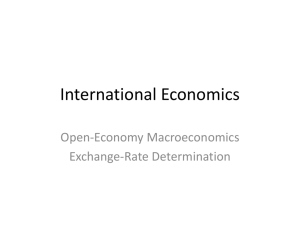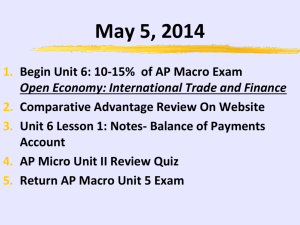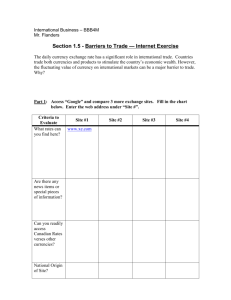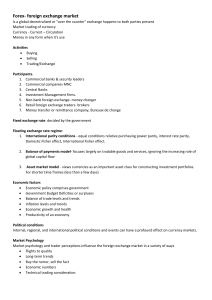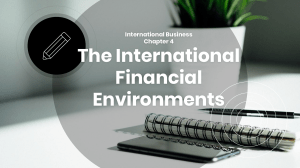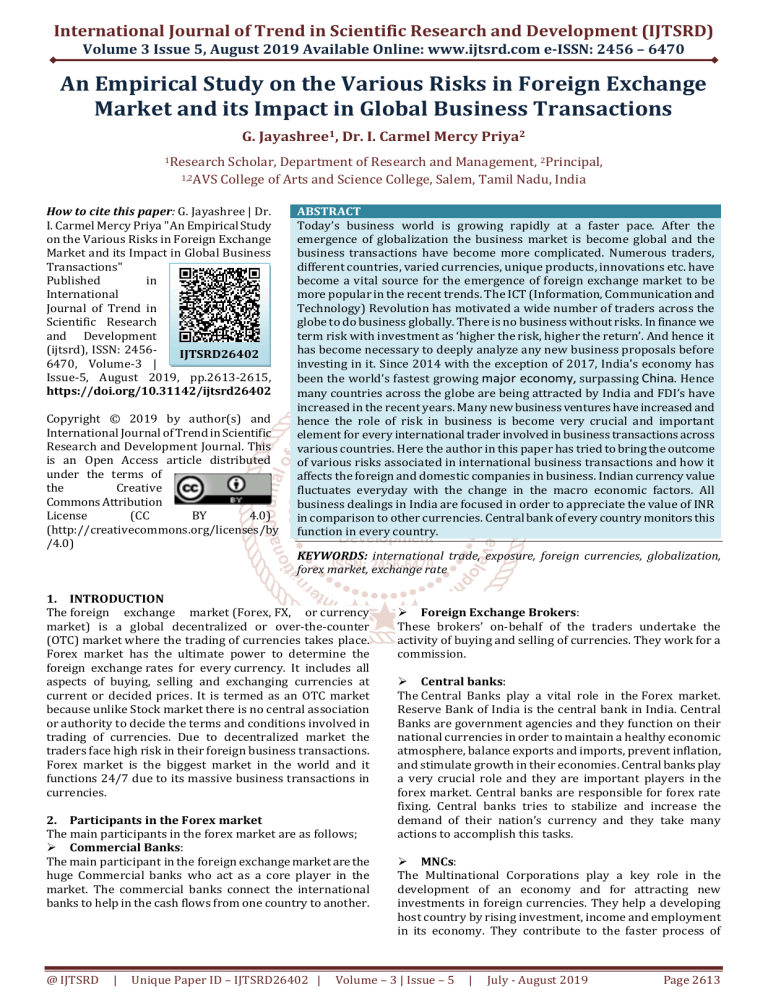
International Journal of Trend in Scientific Research and Development (IJTSRD)
Volume 3 Issue 5, August 2019 Available Online: www.ijtsrd.com e-ISSN: 2456 – 6470
An Empirical Study on the Various Risks in Foreign Exchange
Market and its Impact in Global Business Transactions
G. Jayashree1, Dr. I. Carmel Mercy Priya2
1Research
Scholar, Department of Research and Management, 2Principal,
1,2AVS College of Arts and Science College, Salem, Tamil Nadu, India
How to cite this paper: G. Jayashree | Dr.
I. Carmel Mercy Priya "An Empirical Study
on the Various Risks in Foreign Exchange
Market and its Impact in Global Business
Transactions"
Published
in
International
Journal of Trend in
Scientific Research
and Development
(ijtsrd), ISSN: 2456IJTSRD26402
6470, Volume-3 |
Issue-5, August 2019, pp.2613-2615,
https://doi.org/10.31142/ijtsrd26402
Copyright © 2019 by author(s) and
International Journal of Trend in Scientific
Research and Development Journal. This
is an Open Access article distributed
under the terms of
the
Creative
Commons Attribution
License
(CC
BY
4.0)
(http://creativecommons.org/licenses/by
/4.0)
ABSTRACT
Today’s business world is growing rapidly at a faster pace. After the
emergence of globalization the business market is become global and the
business transactions have become more complicated. Numerous traders,
different countries, varied currencies, unique products, innovations etc. have
become a vital source for the emergence of foreign exchange market to be
more popular in the recent trends. The ICT (Information, Communication and
Technology) Revolution has motivated a wide number of traders across the
globe to do business globally. There is no business without risks. In finance we
term risk with investment as ‘higher the risk, higher the return’. And hence it
has become necessary to deeply analyze any new business proposals before
investing in it. Since 2014 with the exception of 2017, India's economy has
been the world's fastest growing major economy, surpassing China. Hence
many countries across the globe are being attracted by India and FDI’s have
increased in the recent years. Many new business ventures have increased and
hence the role of risk in business is become very crucial and important
element for every international trader involved in business transactions across
various countries. Here the author in this paper has tried to bring the outcome
of various risks associated in international business transactions and how it
affects the foreign and domestic companies in business. Indian currency value
fluctuates everyday with the change in the macro economic factors. All
business dealings in India are focused in order to appreciate the value of INR
in comparison to other currencies. Central bank of every country monitors this
function in every country.
KEYWORDS: international trade, exposure, foreign currencies, globalization,
forex market, exchange rate
1. INTRODUCTION
The foreign exchange market (Forex, FX, or currency
market) is a global decentralized or over-the-counter
(OTC) market where the trading of currencies takes place.
Forex market has the ultimate power to determine the
foreign exchange rates for every currency. It includes all
aspects of buying, selling and exchanging currencies at
current or decided prices. It is termed as an OTC market
because unlike Stock market there is no central association
or authority to decide the terms and conditions involved in
trading of currencies. Due to decentralized market the
traders face high risk in their foreign business transactions.
Forex market is the biggest market in the world and it
functions 24/7 due to its massive business transactions in
currencies.
2. Participants in the Forex market
The main participants in the forex market are as follows;
Commercial Banks:
The main participant in the foreign exchange market are the
huge Commercial banks who act as a core player in the
market. The commercial banks connect the international
banks to help in the cash flows from one country to another.
@ IJTSRD
|
Unique Paper ID – IJTSRD26402 |
Foreign Exchange Brokers:
These brokers’ on-behalf of the traders undertake the
activity of buying and selling of currencies. They work for a
commission.
Central banks:
The Central Banks play a vital role in the Forex market.
Reserve Bank of India is the central bank in India. Central
Banks are government agencies and they function on their
national currencies in order to maintain a healthy economic
atmosphere, balance exports and imports, prevent inflation,
and stimulate growth in their economies. Central banks play
a very crucial role and they are important players in the
forex market. Central banks are responsible for forex rate
fixing. Central banks tries to stabilize and increase the
demand of their nation’s currency and they take many
actions to accomplish this tasks.
MNCs:
The Multinational Corporations play a key role in the
development of an economy and for attracting new
investments in foreign currencies. They help a developing
host country by rising investment, income and employment
in its economy. They contribute to the faster process of
Volume – 3 | Issue – 5
|
July - August 2019
Page 2613
International Journal of Trend in Scientific Research and Development (IJTSRD) @ www.ijtsrd.com eISSN: 2456-6470
growth and development of the nation through transfer of
technology, finance and modern management.
Individuals and Small Businesses:
The small traders also build high business transactions in a
country. These businesses do trading in bulk of
small/cheaper products but at the same time they contribute
a major income for an economy’s growth and development.
Small businesses also make use of forex market to aid
execution of commercial or investment transactions. The
foreign wants of these small business players are usually tiny
and they account for only a fraction of all foreign exchange
transactions. Though they are very important participants in
the market. Some of these participants use the market to
hedge currency risk. Hedgers normally use various
techniques to cover their risk in currency fluctuations. For
instance, importers and exporters occupied in foreign trade
may have open positions in numerous foreign currencies.
They may therefore get affected if there is a variation in the
value of foreign currency. As a result, to safeguard
themselves against these losses, hedgers undertake opposite
positions in the market. Therefore if there is an adverse
fluctuation in their original position, it is offset or
compensated by an opposite movement in their hedged
positions. Their profits and losses and therefore equalized
and hence they get stability in the operations of their
business.
Role of speculators in forex market:
The retail market involves transactions made by smaller
speculators and investors. Speculators are a group of traders
who have no genuine requirement or need of any foreign
currency. They only undertake the trading activity with a
hope of making a small profit from it. The number of
speculators rises a lot when the market sentiment is very
high and every trader seems to be earning money in the
Forex markets. Speculators usually do not have open
positions in any currency for a very longer period. Their
positions are for a short term and are only meant to make a
short term profit. These transactions are carried out by the
forex brokers who act as a mediator between the retail
market and the interbank market. They mainly operate
through forex platforms that offer tight spreads, spot
execution and highly leveraged margin accounts.
3. Types of Forex exposure
The foreign exchange transactions are a bundle of varied
currencies and hence the amount of risk involved in the
transactions is very high. Hence it becomes necessary for
every trader to understand the various risks associated in
forex market that may affect their business transactions
massively. The major three types of forex exposure are as
follows;
a.
Transaction exposure
b.
Operating exposure
c.
Translation exposure
A. Transaction Exposure
Definition: The Transaction Exposure is a one type of foreign
exchange risk involved in the international trade which
involves cross-currency transactions (multiple currencies).
In other words, a risk that is faced by the company while
doing business in international trade, the currency exchange
rates may fluctuate before making the final settlement, and
this is termed as a transaction exposure.
@ IJTSRD
|
Unique Paper ID – IJTSRD26402 |
For example, If an Indian exporter has the receivable of
$5,00,00, due five months. Here in this case if the dollar
value depreciates relative to the rupee, then the exporter
will suffer the cash loss. But in the case of a payable of the
same amount, the exporter gains if the dollar depreciates
(decreases) relative to the rupee.
Thus, once the cross-currency contract has been agreed
upon by the firms located in two different countries in two
different currencies for the specific amount of goods and
money, the contract value may vary with the fluctuations in
the foreign exchange rates. This risk of fluctuation in the
exchange currency rates is called the transaction exposure.
The higher the time gap between the contract and the final
settlement, the greater is the risk involved with the change
in the foreign exchange rates. However, the companies could
safeguard themselves against the transaction exposure
through hedging techniques.
B. Operating Exposure
Definition: The Operating Exposure refers to the extent to
which the firm’s future cash flows get affected due to the
alteration in the foreign exchange rates along with the price
fluctuations. In other words, a risk that firm’s revenue will be
severely affected due to the substantial change in the
exchange rate and the inflation rate is called as operating
exposure.
Operating Exposure, like transaction exposure, also includes
the actual or potential gain or loss, but the transaction
exposure is specific in nature and deals with a particular
transaction of the firm, while the operating exposure deals
with certain macro level exposure whereas not only the firm
under concern gets affected but rather the whole industry
and the economy observes the change with the variation in
the exchange rates and the inflation rate. Therefore the
operating exposure affects the entire economy and is
exposed to the foreign exchange risk.
Operating exposure is much broader as compared to
transaction exposure. And in general it relates to the entire
investment of the firm and if the exchange rate gets altered
the overall value of the firm gets affected. The firm’s value is
constituted of the operating cash flows and the total assets
the firm possesses.
C. Translation Exposure
Definition: The Translation
Exposure or Accounting
Exposure is the risk of loss experienced when stock, revenue,
assets or liabilities denominated in foreign currency varies
with the movement of the foreign exchange rates.
In other words, the translation exposure starts from the
requirement and need of converting the subsidiary’s assets
and liabilities (operating in another country) denominated in
foreign currency in the home currency of the parent
company, at the time of arranging the consolidated profit
and loss statement and the balance sheet. Thus, any
modification in the foreign exchange rate will have a
considerable impact on the financial statements.
If there is any alter made in the exchange rate over the
previous accounting period, then the translation of the items
denominated in the foreign currency will result in foreign
exchange profits or losses, except if there is a tax implication
Volume – 3 | Issue – 5
|
July - August 2019
Page 2614
International Journal of Trend in Scientific Research and Development (IJTSRD) @ www.ijtsrd.com eISSN: 2456-6470
on these items. The translation exposure is concerned with
the accounted profits and the balance sheet values and it
does not influence the overall value of the firm. Since the
profits or losses suffered due to the translation of financial
items has no big impact on the stock prices of the firm.
4. Conclusion
The global market today has motivated every trader doing
business domestically to engage in international trade. Not
all traders are educated and aware of the foreign
transactions risks and hence many businesses face huge
losses and are not traced anymore in the market. The era of
globalization has brought immense contributions to our
economy’s growth and development. India is still developing
and today we are become more competent to sustain in this
global market against many developed nations like USA,
@ IJTSRD
|
Unique Paper ID – IJTSRD26402 |
Germany, and Russia etc. Thus the study can be concluded by
saying that international business transactions on the whole
sculpts a nation in a better way and enhances the standard of
living of the people as a whole and hence the international
traders much be well educated regarding the various
business exposure or risks so as to sustain in the long-run.
References
[1] Baporikar, N. (2007) Entrepreneurship Development &
Project Management- Himalaya Publication House.
[2] Fundamentals of International Financial Management
by S. Kevin(2009), Professor of Commerce and Pro Vice
Chancellor, University of Kerala, Thiruvananthapuram
[3] Online Source
Volume – 3 | Issue – 5
|
July - August 2019
Page 2615

